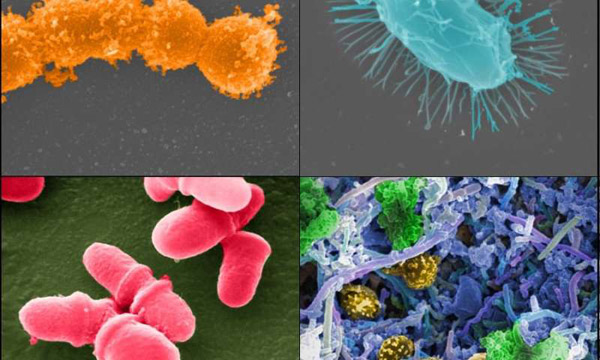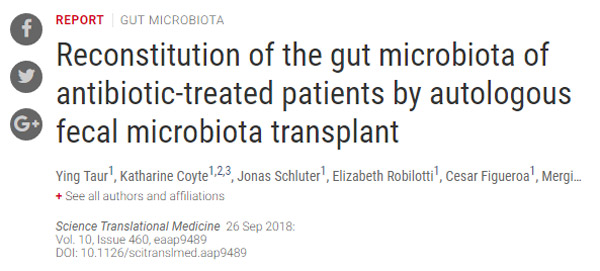Fecal transplantation helps cancer patients recover intestinal beneficial bacteria
October 31, 2018 Source: Ministry of Science and Technology
Window._bd_share_config={ "common":{ "bdSnsKey":{ },"bdText":"","bdMini":"2","bdMiniList":false,"bdPic":"","bdStyle":" 0","bdSize":"16"},"share":{ }};with(document)0[(getElementsByTagName('head')[0]||body).appendChild(createElement('script')) .src='http://bdimg.share.baidu.com/static/api/js/share.js?v=89860593.js?cdnversion='+~(-new Date()/36e5)];
Researchers at the Memorial Sloan-Kettering Cancer Center in the United States have found that autologous fecal microbiota transplantation (auto-FMT) is a safe and effective method to help with high-intensity antibiotics during allogeneic hematopoietic stem cell transplantation. Cancer patients supplement beneficial intestinal bacteria. In this study, patients undergoing surgery were randomized into two groups: one receiving routine care and the other receiving auto-FMT. The researchers found that auto-FMT was able to restore the patient's intestinal beneficial bacteria to near baseline levels within a few days, thereby restoring their digestion, immunity and other basic functions. In the case of standard care, beneficial bacteria usually take several weeks to recover from antibiotic treatment, leaving patients at risk for other infectious diseases, including Clostridium difficile infection.
This research has been published in the recent Science Translational Medicine. The National Institute of Allergy and Infectious Diseases (NIAID, part of the NIH) provided partial funding for the project. Anthony S. Fauci, head of NIAID, said: "This important study shows that clinical interventions using auto-FMT can safely reverse the negative effects of broad-spectrum antibiotic treatment. If validated in larger studies This approach may be a simple treatment for quickly recovering a healthy microbiome after receiving high-intensity antibiotics."

Allogeneic hematopoietic cell transplantation involves donor (usually a family member) administered to recipient stem cells. Stem cells are able to rebuild the ability of the bone marrow to produce blood cells and restore immune function to fight cancer. Antibiotics are essential for preventing bacterial infections in stem cell receptors. However, antibiotics often destroy beneficial bacteria that enhance immune function and fight infection. Loss of beneficial bacteria increases the risk of certain life-threatening infections and graft-versus-host disease (GVHD).
The cancer patients in the study provided their own stool samples that were stored frozen prior to the cell transplant procedure. A few weeks later, when the doctor determines that the transplanted cells have begun to grow, they will assess the condition of the patient's intestinal beneficial bacteria. Twenty-five patients with known beneficial bacteria were enrolled in the study and were randomized into two groups: 14 received auto-FMT via an enema and 11 received conventional treatment. Patients treated with auto-FMT restored bacterial diversity, composition, and function, while beneficial bacteria in the other 11 control groups recovered slowly.
The researchers conducted ongoing monitoring of patients participating in the study to determine whether auto-FMT could improve patient outcomes, such as bacterial, viral, fungal infections, and the incidence and severity of GVHD. Whether the fecal samples of other healthy donors can restore beneficial bacteria as effectively as the patient's own stool samples remains to be studied.
The Fluorochemicals compound is a new field in modern organic chemistry. It has a special physical and chemical properties, so it is widely used in the earliest development of applied pesticides and rat poison. During World War II it was developed in some countries appliedas antimicrobial agents, there are more and more new research suggests that fluorochemical will play an increasingly more important role in the field of anticancer drugs. We started later in the field of fluorochemicals, but we have a strong sense of his enormous potential, and we are increasing investment to catch up. We will custom product which has potential market prospects from gram and kilogram-class through process optimization, enlarged to the size of ton. Currently we have developed more fluorochemical compounds in the benzoic acid range, the number of products have been more than 2017.
Organic Fluorochemical Compound,FluorineCompounds,Containing Benzoic Acids
Taizhou Volsen Chemical Co., Ltd. , https://www.volsenchem.com